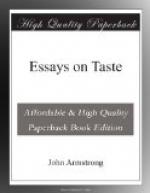“Lord, Madam! ’tis so unpolite to cry!—
For shame, my dear! d’ye credit all this stuff?—
I vow—well, this is innocent enough?”
At Athens long ago, the Ladies—(married) 225
Dreamt not they misbehav’d tho’ they miscarried,
When a wild poet with licentious rage
Turn’d fifty furies loose upon the stage.
They were so tender and so
easy mov’d,
Heav’ns! how the Grecian ladies
must have lov’d!
For all the fine sensations still have
dwelt, 231
Perhaps, where one was exquisitely felt.
Thus he who heavenly Maro truly feels
Stands fix’d on Raphael, and at
Handel thrills.
The grosser senses too, the taste, the
smell, } 235
Are likely truest where the fine prevail:
}
Who doubts that Horace must have cater’d
well? }
Friend, I’m a shrewd observer, and
will guess
What books you doat on from your fav’rite
mess,
Brown and L’Estrange will surely
charm whome’er
The frothy pertness strikes of weak small-beer.
Who steeps the calf’s fat loin in
greasy sauce
Will hardly loathe the praise that bastes
an ass.
Who riots on Scotcht Collops scorns not
any
Insipid, fulsome, trashy miscellany;
245
And who devours whate’er the cook
can dish up,
Will for a classic consecrate each[A]
bishop.
[Footnote A: See Felton’s Classics.]
But I am sick of pen and ink;
and you
Will find this letter long enough.
Adieu!
OF GENIUS
There is a standard of right and wrong in the nature of things, of beauty and deformity, both in the natural and moral world. And as different minds happen to be more or less exquisite, the more or less sensibly do they perceive the various degrees, of good and bad, and are the more or less susceptible of being charmed with what is right or beautiful, and disgusted with what is wrong or deformed. It is chiefly this sensibility that constitutes genius; to which a sound head and a good heart are as effectual as a lively imagination. And a man of true genius must necessarily have as exquisite a feeling of the moral beauties, as of whatever is great or beautiful in the works of nature; or masterly in the arts which imitate nature, in poetry, painting, statuary, and music.
On the other side, where the heart is very bad, the genius and taste, if there happen to be any pretensions to them, will be found shocking and unnatural. NERO would be nothing less than a poet; but his verses were what one may call most villainously bad. His taste of magnificence and luxury was horribly glaring, extravagant and unnatural to the last degree.
CALIGULA’s taste was so outragiously wrong, that he detested the works of the sweet MANTUAN poet more passionately than ever MOECENAS admired them; and if VIRGIL had unfortunately lived down to those times in which that monster appeared, he would probably have been tortured to death for no other crime but that he wrote naturally, and like an honest man.




